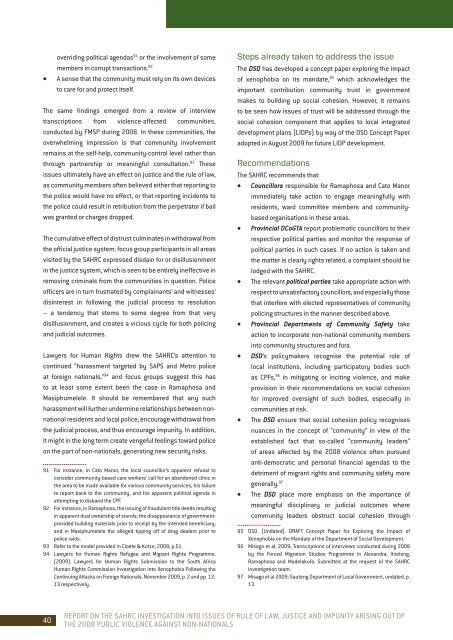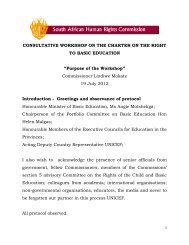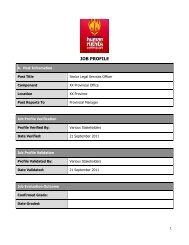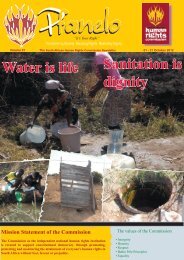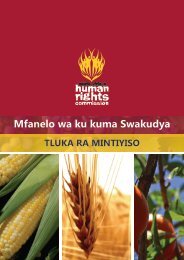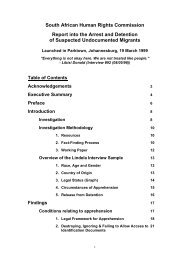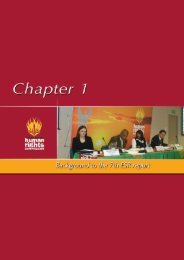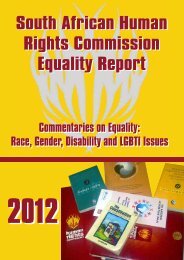Chapter 1 - South African Human Rights Commission
Chapter 1 - South African Human Rights Commission
Chapter 1 - South African Human Rights Commission
You also want an ePaper? Increase the reach of your titles
YUMPU automatically turns print PDFs into web optimized ePapers that Google loves.
overriding political agendas 91 or the involvement of some<br />
members in corrupt transactions. 92<br />
• A sense that the community must rely on its own devices<br />
to care for and protect itself.<br />
The same findings emerged from a review of interview<br />
transcriptions from violence-affected communities,<br />
conducted by FMSP during 2008. In these communities, the<br />
overwhelming impression is that community involvement<br />
remains at the self-help, community-control level rather than<br />
through partnership or meaningful consultation. 93 These<br />
issues ultimately have an effect on justice and the rule of law,<br />
as community members often believed either that reporting to<br />
the police would have no effect, or that reporting incidents to<br />
the police could result in retribution from the perpetrator if bail<br />
was granted or charges dropped.<br />
The cumulative effect of distrust culminates in withdrawal from<br />
the official justice system: focus group participants in all areas<br />
visited by the SAHRC expressed disdain for or disillusionment<br />
in the justice system, which is seen to be entirely ineffective in<br />
removing criminals from the communities in question. Police<br />
officers are in turn frustrated by complainants’ and witnesses’<br />
disinterest in following the judicial process to resolution<br />
– a tendency that stems to some degree from that very<br />
disillusionment, and creates a vicious cycle for both policing<br />
and judicial outcomes.<br />
Lawyers for <strong>Human</strong> <strong>Rights</strong> drew the SAHRC’s attention to<br />
continued “harassment targeted by SAPS and Metro police<br />
at foreign nationals,” 94 and focus groups suggest this has<br />
to at least some extent been the case in Ramaphosa and<br />
Masiphumelele. It should be remembered that any such<br />
harassment will further undermine relationships between nonnational<br />
residents and local police, encourage withdrawal from<br />
the judicial process, and thus encourage impunity. In addition,<br />
it might in the long term create vengeful feelings toward police<br />
on the part of non-nationals, generating new security risks.<br />
91 For instance, in Cato Manor, the local councillor’s apparent refusal to<br />
consider community-based care workers’ call for an abandoned clinic in<br />
the area to be made available for various community services, his failure<br />
to report back to the community, and his apparent political agenda in<br />
attempting to disband the CPF.<br />
92 For instance, in Ramaphosa, the issuing of fraudulent title deeds resulting<br />
in apparent dual ownership of stands; the disappearance of governmentprovided<br />
building materials prior to receipt by the intended beneficiary;<br />
and in Masiphumelele the alleged tipping off of drug dealers prior to<br />
police raids.<br />
93 Refer to the model provided in Cloete & Kotze, 2009, p.51.<br />
94 Lawyers for <strong>Human</strong> <strong>Rights</strong> Refugee and Migrant <strong>Rights</strong> Programme.<br />
(2009). Lawyers for <strong>Human</strong> <strong>Rights</strong> Submission to the <strong>South</strong> Africa<br />
<strong>Human</strong> <strong>Rights</strong> <strong>Commission</strong> Investigation into Xenophobia Following the<br />
Continuing Attacks on Foreign Nationals, November 2009, p. 2 and pp. 12-<br />
13 respectively.<br />
Steps already taken to address the issue<br />
The DSD has developed a concept paper exploring the impact<br />
of xenophobia on its mandate, 95 which acknowledges the<br />
important contribution community trust in government<br />
makes to building up social cohesion. However, it remains<br />
to be seen how issues of trust will be addressed through the<br />
social cohesion component that applies to local integrated<br />
development plans (LIDPs) by way of the DSD Concept Paper<br />
adopted in August 2009 for future LIDP development.<br />
Recommendations<br />
The SAHRC recommends that:<br />
• Councillors responsible for Ramaphosa and Cato Manor<br />
immediately take action to engage meaningfully with<br />
residents, ward committee members and communitybased<br />
organisations in these areas.<br />
• Provincial DCoGTA report problematic councillors to their<br />
respective political parties and monitor the response of<br />
political parties in such cases. If no action is taken and<br />
the matter is clearly rights related, a complaint should be<br />
lodged with the SAHRC.<br />
• The relevant political parties take appropriate action with<br />
respect to unsatisfactory councillors, and especially those<br />
that interfere with elected representatives of community<br />
policing structures in the manner described above.<br />
• Provincial Departments of Community Safety take<br />
action to incorporate non-national community members<br />
into community structures and fora.<br />
• DSD’s policymakers recognise the potential role of<br />
local institutions, including participatory bodies such<br />
as CPFs, 96 in mitigating or inciting violence, and make<br />
provision in their recommendations on social cohesion<br />
for improved oversight of such bodies, especially in<br />
communities at risk.<br />
• The DSD ensure that social cohesion policy recognises<br />
nuances in the concept of “community” in view of the<br />
established fact that so-called “community leaders”<br />
of areas affected by the 2008 violence often pursued<br />
anti-democratic and personal financial agendas to the<br />
detriment of migrant rights and community safety more<br />
generally. 97<br />
• The DSD place more emphasis on the importance of<br />
meaningful disciplinary or judicial outcomes where<br />
community leaders obstruct social cohesion through<br />
95 DSD. (Undated). DRAFT Concept Paper for Exploring the Impact of<br />
Xenophobia on the Mandate of the Department of Social Development.<br />
96 Misago et al, 2009; Transcriptions of interviews conducted during 2008<br />
by the Forced Migration Studies Programme in Alexandra, Itireleng,<br />
Ramaphosa and Madelakufa. Submitted at the request of the SAHRC<br />
investigation team.<br />
97 Misago et al 2009; Gauteng Department of Local Government, undated, p.<br />
13.<br />
40<br />
REPORT ON THE SAHRC INVESTIGATION INTO ISSUES OF RULE OF LAW, JUSTICE AND IMPUNITY ARISING OUT OF<br />
THE 2008 PUBLIC VIOLENCE AGAINST NON-NATIONALS


